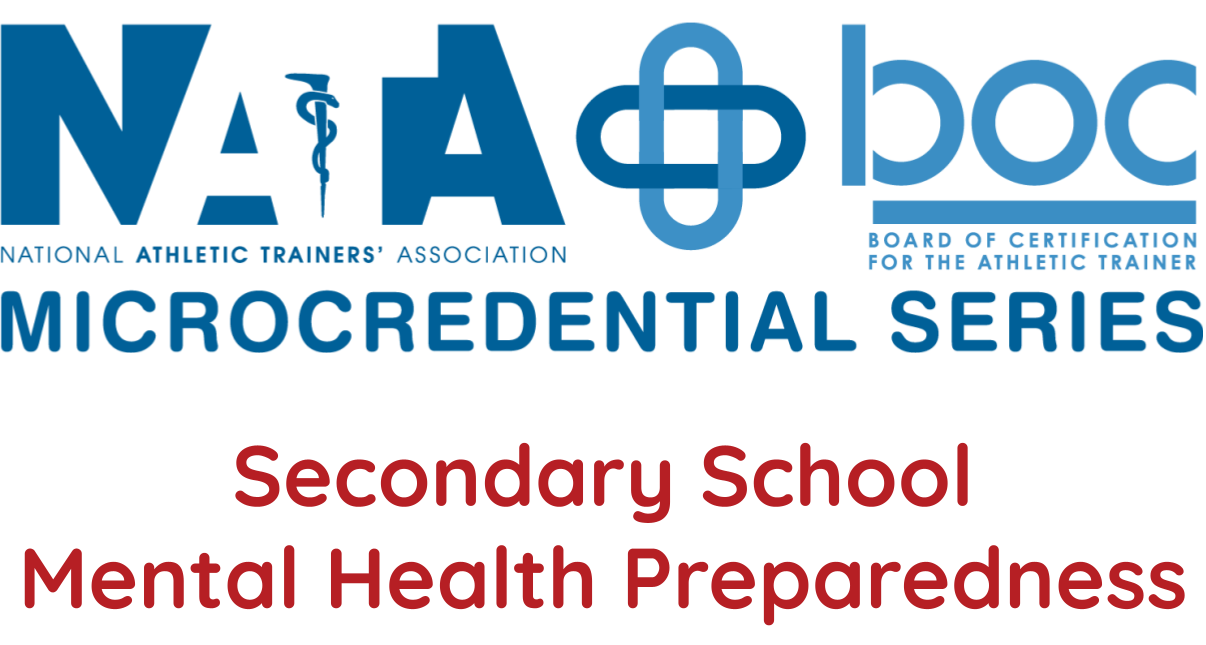
NATA Position Statement - Immediate Management of Joint Dislocations
-
Register
- Non-member - $25
- Member - $15
- Student - $15
- Staff - Free!
- Certified Student - $15
- Retired - $15
Abstract:
Joint dislocations are common in athletes and physically active populations. Early recognition, reduction, and management of these injuries, when appropriate, has several advantages for the patient; however, persistent controversy remains about the immediate management of acute and recurrent joint dislocations by Athletic Trainers. Additionally, there is substantial practice variability in how joint dislocations are managed. This is due to gaps in knowledge, competency, and performance. The purpose of this EBP course is to review recent evidence-based recommendations for the immediate management of joint dislocations and to apply these recommendations to examples for commonly injured joints.
Objectives:
- Participant will be able to summarize the NATA´s recommendations and guidelines for the immediate management of patients with joint dislocations.,
- Participant will be able to, under the direction of a physician and in compliance with state regulations, establish a policy for the immediate management of patients with joint dislocations.,
- Participants will be able to incorporate basic joint reduction techniques for the glenohumeral, patellofemoral, metacarpophalangeal, and interphalangeal joints into their clinical practice.,
- Participants will be able to describe the advantages and disadvantages to immediate joint reduction as well as the legal considerations.
Level:
Advanced
Domains:
Domain 1: Risk Reduction Wellness and Health Literacy
Domain 2: Assessment Evaluation and Diagnosis
CEUs:
1.0 Category A
Keywords: joint, reduction, dislocation, glenohumeral, patellofemoral, metacarpophalangeal, interphalangeal, NATA Position Statement
Course Expiration:
This premium course offering must be completed within 12 months from the purchase date.

Created in collaboration with the NATA Foundation Educational Resources Committee.
A portion of the proceeds from this course is donated to the NATA Research & Education Foundation.
Kenneth Cameron, PhD, MPH, ATC, FNATA
Dr. Cameron currently serves as the Director of Orthopaedic and Sports Medicine Research at Keller Army Hospital, West Point, New York, where he holds faculty appointments with the John A. Feagin Jr. Orthopaedic Sports Medicine Fellowship and the US Army-Baylor University Sports Physical Therapy Doctoral Program. Dr. Cameron also serves as a Professor in the Departments of Surgery and Physical Medicine and Rehabilitation at the Uniformed Services University of the Health Sciences. Dr. Cameron’s primary research interests are in the areas of injury prevention, musculoskeletal injury and disease epidemiology, and outcomes associated with the treatment of these injuries, specifically in physically active and military populations. He also has specific research interests in knee and ankle injuries, shoulder instability, biomarkers associated with post-traumatic osteoarthritis, and sports related concussion.
Dr. Cameron was competitively selected to participate in the U.S. Bone and Joint Decade Young Investigator’s Initiative in 2007 and he has subsequently obtained research funding support as a principal investigator from The Orthopaedic Research and Education Foundation, The National Athletic Trainers’ Association Research and Education Foundation, and The U.S. Army Medical Research and Material Command’s Post-Traumatic Stress Disorder and Traumatic Brain Injury Research, Peer Reviewed Medical Research, and Peer Reviewed Orthopaedic Research programs, respectively. He has also obtained research funding through the Military Operational Medicine Research Program (JPC-5). Dr. Cameron has also obtained research funding support as a co-investigator/site principal investigator on projects funded by the National Institutes of Health (NIAMS) and the National Collegiate Athletic Association (NCAA). Dr. Cameron currently serves as the site principal investigator for the NCAA-DoD funded Concussion Assessment, Research and Education (CARE) Consortium research activities at the United States Military Academy at West Point. Dr. Cameron has authored over 150 peer-reviewed manuscripts and has presented his work nationally and internationally.
Dr. Cameron earned the Commander’s Award for Civilian Service in recognition of exemplary service to the United States Military Academy in 2004 and the Department of the Army Superior Civilian Service Award in 2014. Dr. Cameron’s work has resulted in several research awards. These awards include the Arthritis Foundation’s New Investigator Award (2010), The Johns Hopkins School of Public Health MPH Capstone Research Award (2011), the Society of Military Orthopaedic Surgeons Founders’ Award for the best scientific paper with military relevance (2011), the American Medical Society for Sports Medicine Research Award for the Best Scientific Research Paper presented at the AMSSM annual meeting (2013), and the American Orthopaedic Society for Sports Medicine’s Best Scientific Poster Award (2011), Aircast Award (2013, 2014, 2015) for the Best Clinical Science Paper submitted by a sports medicine fellow, and O’Donoghue Award (2012) for the best overall paper which deals with clinical based research or human in-vivo research. In 2015 Dr. Cameron earned designation as a Fellow in the National Athletic Trainers’ Association (FNATA) for exemplary scholarship and service and in 2017 he earned the National Athletic Trainers’ Association Most Distinguished Athletic Trainer (MDAT) award recognizing exemplary professional service at the district and national levels. Dr. Cameron also earned the United States Sports Academy Dr. Ernst Jokl Sports Medicine Award in 2017. Dr. Cameron was recognized by The Geneva Foundation Scientific Advisory Board as the 2020 Researcher of the Year. The Researcher of the Year award is presented to a researcher who exemplifies Geneva’s mission of advancing innovative medical research within the U.S. military, for the benefit of U.S. service members and veterans, their families, and the global community.
Megan (Houston) Roach, PhD, ATC
Musculoskeletal Expert for Extremity Trauma and Amputation Center of Excellence (EACE)


